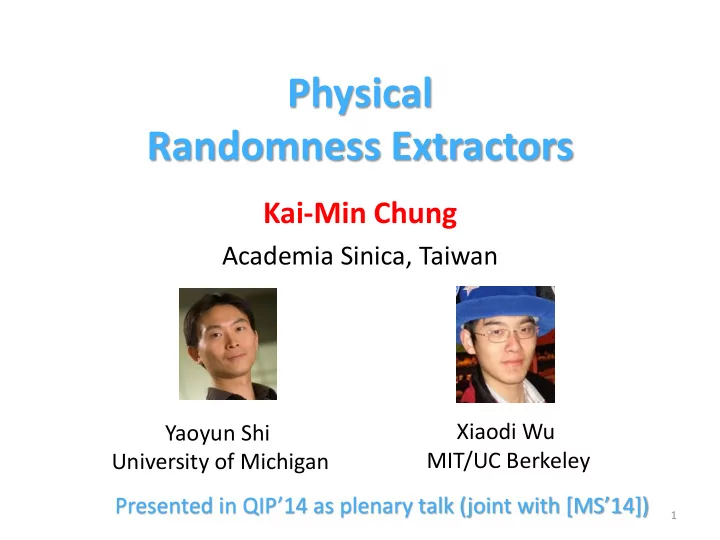

Physical Randomness Extractors Kai-Min Chung Academia Sinica, Taiwan Xiaodi Wu Yaoyun Shi MIT/UC Berkeley University of Michigan Presented in QIP’14 as plenary talk (joint with [MS’14]) 1
Randomness • Randomness is a vital resource – necessary in cryptography – pervasive in computer science • How can we be sure a source is truly random? – Bias? Correlation? – and… 2
Randomness • Randomness is a vital resource – necessary in cryptography – pervasive in computer science • How can we be sure a source is truly random? What are the minimal assumptions for generating (almost) uniform randomness? – Bias? Correlation? – and… 3
Classical Answer — Randomness Extractors • Extract pure randomness from “weak” sources. Seeded Randomness Extractor source seed Ext ≈ uniform output 4
Classical Answer — Randomness Extractors • Extract pure randomness from “weak” sources. Require: – sufficient min-entropy Necessary! – at least two independent sources Two-source Randomness Extractor source source Ext ≈ uniform output 5
Classical Answer — Randomness Extractors • Extract pure randomness from “weak” sources. Require: – sufficient min-entropy Necessary! – at least two independent sources source source Ext ≈ uniform output 6
Classical Answer — Randomness Extractors • Extract pure randomness from “weak” sources. Require: – sufficient min-entropy Necessary! – at least two independent sources Can independence assumption be avoided? source source Ext ≈ uniform output 7
Our Proposal — Physical Randomness Extractors • Requirements: – source has sufficient min-entropy Necessary! – spatial separate devices device device device source Phy−Ext ≈ uniform output Accept/Reject 8
Our Proposal — Physical Randomness Extractors • Requirements: – source has sufficient min-entropy Necessary! – spatial separate devices devices devices devices source Phy−Ext ≈ uniform output Accept/Reject 9
Our Proposal — Physical Randomness Extractors No independence assumption: • Requirements: • allow source-device correlation • only need random-to-device source, – source has sufficient min-entropy Necessary! i.e., H min (source|devices) > k 0 – spatial separate devices devices devices devices source No trust on devices Completeness : if devices honest ⟹ Phy−Ext accept w.h.p. & output ≈ uniform Soundness : if devices malicious ⟹ either reject w.h.p. or (output|accept) ≈ uniform ≈ uniform output Accept/Reject 10
Our Result — Efficient Physical Randomness Extractor • Extract arbitrary N bits of randomness using source with O(1)-bit entropy and O(1) devices with 0.001 error in 𝑃 (N) time with additional features devices devices devices source Phy−Ext ≈ uniform output Accept/Reject 11
Physics Answer — Quantum Random Number Generator • Generate pure randomness by measuring q-bits in superposition. device 12
Physics Answer — Quantum Random Number Generator • Generate pure randomness by measuring q-bits in superposition. However… device • Noise – inherent – bias outcome 1 0 + 1 𝜔 = |1〉 2 2 0101000010110 … 13
Physics Answer — Quantum Random Number Generator • Generate pure randomness by measuring q-bits in superposition. However… device • Noise – inherent – bias outcome 1 0 + 1 entanglement 𝜔 = |1〉 • Adversary 2 2 – no entropy against Adv! 0101000010110 … 0101000010110 … 14
Physics Answer — Quantum Random Number Generator • Generate pure randomness by measuring q-bits in Can we avoid trusting quantum devices? superposition. However… Well, this is not new …… device • Noise Device-independent Quantum Cryptography – inherent The Central Rule: Trust classical operations only, without – bias outcome assumption on inner-working of super-classical devices. 1 0 + 1 entanglement 𝜔 = |1〉 Origins in the 90’s [Mayers - Yao’98] • Adversary 2 2 Develop rapidly very recently! – no entropy! 0101000010110 … 0101000010110 … 15
Our Result — Efficient Physical Randomness Extractor • Extract arbitrary N bits of randomness using source with O(1)-bit entropy and O(1) devices with 0.001 error in 𝑃 (N) time with additional features • Prior to our work, only known how to extract a single bit from Santha-Vazirani (SV) source with non-constructive (thus inefficient) extractors [GMdlT+12] 16
Our Result — Efficient Physical Randomness Extractor • Extract arbitrary N bits of randomness using source with O(1)-bit entropy and O(1) devices with 0.001 error in 𝑃 (N) time with additional features – Robustness : accept w.h.p. w.r.t. honest devices with Ω (1) noise rate. – Simplicity : very simple construction and analysis via composition • Our key composition lemma already found application for (unbounded) randomness expansion to simplify and improve [CY14] Available on arXiv:1402.4797 17
Recommend
More recommend